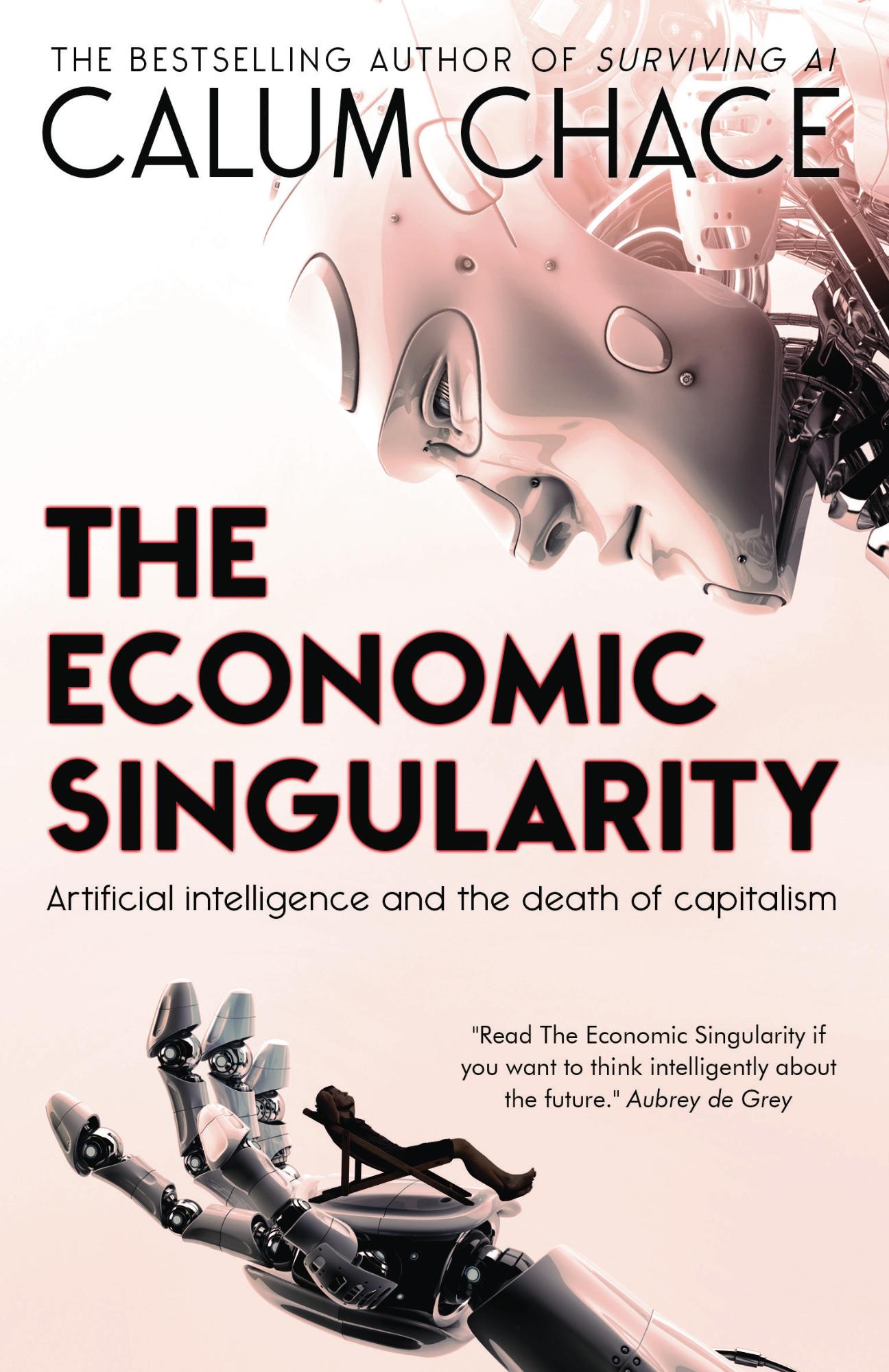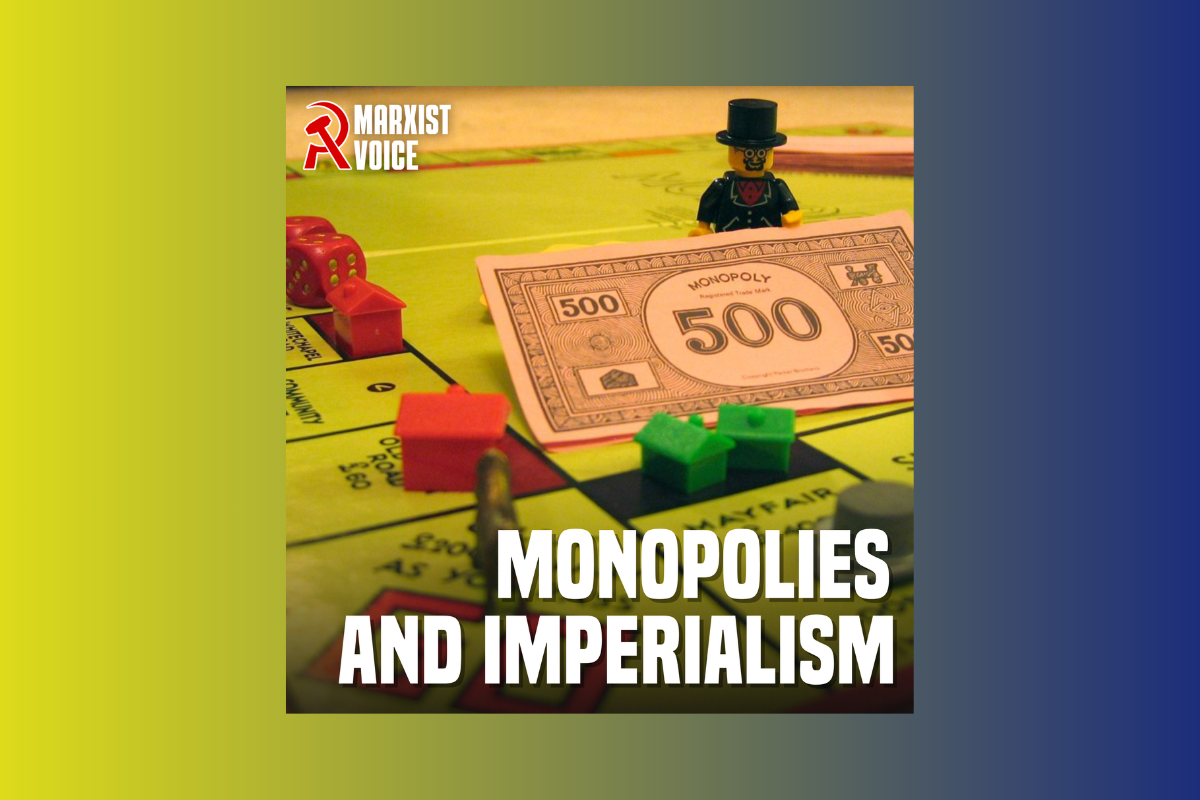Today, in numerous areas, from automation to green energy to information technology, we are seeing a validation of Marx’s assertion: that society’s productive forces at a certain stage come into conflict with the way in which society is organised. These “economic singularities”, as Adam Booth discusses, demonstrate clearly that the system has broken.
singularity
sɪŋɡjʊˈlarɪti
noun
1. A point at which a function takes an infinite value, especially in space–time when matter is infinitely dense, such as at the centre of a black hole.
2. A hypothetical moment in time when artificial intelligence and other technologies have become so advanced that humanity undergoes a dramatic and irreversible change.
“maybe the singularity just happened, and we didn’t notice“
“At a certain stage of development, the material productive forces of society come into conflict with the existing relations of production or – this merely expresses the same thing in legal terms – with the property relations within the framework of which they have operated hitherto. From forms of development of the productive forces these relations turn into their fetters. Then begins an era of social revolution.” (Karl Marx, A Contribution to the Critique of Political Economy, Preface)
In this brief passage, Marx summarises the materialist method of analysing history: the fundamental tenet of which is that the primary driving force in history, in the final analysis, is the need to develop the productive forces – of technology and technique; industry and agriculture; science and culture.
This development, however, at a certain point reaches a barrier in terms of the mode of production – that is, with society’s property relations. In other words, our ability to produce comes into conflict with the way in which society is organised; with the forms of economic distribution; with the legal laws and institutions that define property rights and ownership. At such points, as Marx emphasises, a revolution is required to remove these barriers to society’s development.
Today, as we have commented on elsewhere, there is an ever-increasing recognition in mainstream circles that the capitalist system has reached such a stage as that described by Marx. In particular, the question of automation and artificial intelligence (AI) has led to a growing concern about the possibility of “technological unemployment” – of millions consigned to the scrapheap, unable to find work because they have been made obsolete by modern machinery, robots, and computers.
 As author Calum Chace writes in his book The Economic Singularity: Artificial intelligence and the death of capitalism, we are rapidly approaching a point – the titular “economic singularity”- where technology develops at a pace too rapid for workers to keep up. No amount of education and retraining will help. Humans will be redundant from the perspective of the capitalist productive process.
As author Calum Chace writes in his book The Economic Singularity: Artificial intelligence and the death of capitalism, we are rapidly approaching a point – the titular “economic singularity”- where technology develops at a pace too rapid for workers to keep up. No amount of education and retraining will help. Humans will be redundant from the perspective of the capitalist productive process.
Chace notes, as Marx did 150 years ago in his magnum opus Capital, that this “economic singularity” poses a contradiction under capitalism, for it is the wages workers receive in exchange for their labour power – their ability to work – that ultimately forms the market for the goods that are produced. If there are no workers (and thus no wages), then where will the demand come from for the capitalists’ products? Who will buy the abundance of things that our army of robots are relentlessly churning out?
In turn, this economic contradiction creates unbearable social and political tensions as the wealth in society accumulates into ever fewer hands – the hands of those at the top who own the technologies and industries in which automation and machinery are most rife. Hence the zeitgeist appeal to politicians of demands such as the “universal basic income”, which promise to alleviate the most blatant excesses and inequalities seen under capitalism, without fundamentally challenging or changing the broken status quo.
At the same time, it is workers’ labour that is ultimately the source of all new value in society – and thus the source of the capitalists’ profits also. Machinery does not create value, but merely transfers it from the inputted materials to the outputted product. Without any labour in the productive process, therefore, the proverbial goose that lays the golden egg is killed.
In short, the potential impact of today’s productive forces – to automate away work, vastly reduce the hours of the working week, and provide a world of plenty for everyone – is being stifled by the nature of the capitalist system; a system based on private ownership over the wealth and technology in society and production for profit. To repeat Marx’s assertion: the material productive forces of society have come into conflict with the property relations within the framework of which they have operated hitherto.
Breakdown
The idea of an “economic singularity” aptly describes what is taking place in the most general sense. As the initial definition provided above explains, in the language of mathematics, a singularity is a point at which certain values in an equation become infinite, thus causing existing models and established laws to break down.
The economic singularity that Chace describes is the result of society’s productive forces approaching infinity – that is, the ability to produce what Marx called a “superabundance” of goods. Or to put it inversely, we are reaching an infinitesimal – a point where the labour time required to produce commodities is rapidly tending towards zero.
In cosmology, it is hypothesised that a singularity of infinitely dense matter exists at the centre of so-called “black holes” – massive stars that have collapsed to create objects with a gravitational attraction from which even light cannot escape. At this singularity point, it is assumed that all the known laws of physics cease to operate.
Similarly, as the productive forces approach this infinity of superabundance and infinitesimal of full automation and zero labour time, the laws and dynamics of the capitalist system break down. For the law of value, as explained by Marx, means that as the labour time required in production tends to zero, so too will the value.
But if the general value of commodities falls to nothing, then profits – formed from the surplus value generated in production – will also drop. And if there is no profit to be made, then investment – which under capitalism is only conducted in the pursuit of profit – will grind to a halt too. The contradictions pile up and the system enters into crisis.
Even the bourgeois economists would accept this assertion; in their own words, as the marginal cost of a commodity approaches zero, so too will its price – provided there is a free market, in which the forces of supply and demand are free to operate (e.g. without the existence of monopolies or collusive price-setting). And without price signals, how can the invisible hand of the market operate?
As technology advances, automation and productivity increases, and we approach the potential for superabundance. At the same time, however, the laws of the capitalist market break down. An increasing number of commentators, such as Chace, are recognising this, as demonstrated by the fears about how to handle the contradiction posed by modern automation under capitalism: that we are approaching the “economic singularity” – the point at which we could potentially produce all of society’s needs with almost zero labour requirements; and yet within the current system, this only creates enormous social antagonisms of eye-watering inequality and a race to the bottom for the 99%.
Green energy’s “dirty secret”
 Automation, however, is not the only example of capitalism’s economic singularities. In a leading article earlier this year, the Economist magazine – one of the more serious, sober, and sincere bourgeois journals – announced in an article entitled “clean energy’s dirty secret” that, “the renewables revolution is wrecking the world’s electricity markets”.
Automation, however, is not the only example of capitalism’s economic singularities. In a leading article earlier this year, the Economist magazine – one of the more serious, sober, and sincere bourgeois journals – announced in an article entitled “clean energy’s dirty secret” that, “the renewables revolution is wrecking the world’s electricity markets”.
“It is no longer far-fetched to think that the world is entering an era of clean, unlimited and cheap power,” our esteemed liberal publication proclaims, before going on to pour cold water on any optimism by stating that, “there is a $20trn hitch, though”.
So what’s the catch?
“Normally investors like putting their money into electricity because it offers reliable returns. Yet green energy has a dirty secret. The more it is deployed, the more it lowers the price of power from any source. That makes it hard to manage the transition to a carbon-free future, during which many generating technologies, clean and dirty, need to remain profitable if the lights are to stay on. Unless the market is fixed, subsidies to the industry will only grow.”
What the Economist have accidentally let slip here, however, is not so much green energy’s “dirty secret”, but capitalism’s. For in essence, as the main article on this topic (aptly entitled “a world turned upside down”) hints at, the problem facing policymakers and politicians is that energy is another example of the market failing in the face of capitalism’s economic singularities.
The contradiction is as follows. By definition, the marginal cost of renewable energy is zero: once a wind turbine or solar panel is in place, the electricity it produces by virtue of the wind and the sun is effectively free.
There are, of course, costs associated with green energy sources – the turbines and panels themselves must be produced and maintained, for example. In addition, there are the costs of distributing the electricity generated. All of these feed into the price that consumers pay for their energy. Nevertheless, many of these costs are themselves rapidly decreasing, as new manufacturing techniques and economies of scale enable solar panels, for example, to be mass produced more cheaply.
In this sense, as the Economist highlights above, the greater the renewable energy supply, the more electricity prices are forced downwards. But as prices tend towards zero, so too do the profits of the major energy monopolies. And since these big profit-seeking energy suppliers are only willing to invest in new power generation if they can make money from it, as energy prices decline, investment in all energy sources – renewable or otherwise – dries up.
“Theoretically,” the author affirms, “if renewables were to make up 100% of the market, the wholesale price of electricity would fall to zero, deterring all new investment that was not completely subsidised.” This, effectively, is a tacit admission from the mouthpiece of the capitalist class that the system they defend has failed.
“In short,” our capitalist apologists at the Economist magazine conclude, “policymakers should be clear they have a problem and that the cause is not renewable energy, but the out-of-date system of electricity pricing.”
We would agree, with one caveat: it is not simply an out-of-date system of electricity pricing that is holding back the green energy technologies’ potential, but an out-of-date economic system, full stop.
The price of everything and the value of nothing
 Alongside automation and renewable energy, another clear example of capitalism’s economic singularities is provided by political journalist and writer Paul Mason, who, in his book PostCapitalism (reviewed here), utilises Marx’s labour theory of value to explain the contradictions implicit within an information-based economy.
Alongside automation and renewable energy, another clear example of capitalism’s economic singularities is provided by political journalist and writer Paul Mason, who, in his book PostCapitalism (reviewed here), utilises Marx’s labour theory of value to explain the contradictions implicit within an information-based economy.
The world around us today, Mason contends, is one increasingly based on information. We live in a digital age, where tangible goods have been superseded in many cases by a string of ones and zeros. CDs have been replaced by MP3s; physical models and machines substituted for software and computer programmes.
As Mason correctly highlights, however, “once you can copy and paste something, it can be reproduced for free. It has, in economics-speak, a ‘zero marginal cost’…This has major implications for the way the market operates…All this is eroding the very price mechanism that marginalism describes so perfectly.” (Paul Mason, PostCapitalism, 2015 hardback edition, p117-118 and p163)
Once again, we arise at the contradiction the capitalist market faces as the value of a commodity – its socially necessary labour time – falls to zero. Price signals fail and profits disappear.
The only way for the capitalists in information-based industries (such as music and media) to survive and make profits, then, is not to play by the rules of the free market, but to subvert them entirely – to rely not on competition, but on its opposite: monopoly.
“The equilibrium state of an info-tech economy is one where monopolies dominate and people have unequal access to the information they need to make rational buying decisions. Info-tech, in short, destroys the normal price-mechanism, whereby competition drives prices down toward the cost of production…
“With info-capitalism, a monopoly is not just some clever tactic to maximise profit. It is the only way an industry can run. The small number of companies that dominate each sector is striking…Apple’s mission statement, properly expressed, is to prevent the abundance of music.” (ibid, p118-119)
As with the other “economic singularities” of automation and renewable energy, therefore, the development of information technology has exposed the key contradiction at the heart of the capitalist system: as Mason himself quotes, that “between the ‘forces of production’ and the ‘social relations’”.
In other words, we have the productive ability to create superabundance and satisfy a whole range of global needs; but the ‘social relations’ – the way in which production is owned, controlled, and organised, and the laws and logic of the system flowing from this – prevent us from doing so. As long as there is private ownership and production for profit, it is impossible to resolve this contradiction, and in place of superabundance we see scarcity.
Indeed, this contradiction that info-tech highlights so clearly is already seen in the case of many of our more tangible needs, from food (with supermarkets going to extraordinary lengths to prevent people taking leftover foods from their skips) to medicine (with big pharma companies taking legal action against drug-producers in the developing world for producing “generic” copies of their patented drugs).
Modern technology and automation have opened up a world of possibilities that were previously unimaginable. The horror and injustice lies in the chasm that exists between these hypothetical – and entirely realisable – possibilities and the dystopian future (and present) that capitalism offers, as Mason stresses in his book:
“Technologically, we are headed for zero-price goods, unmeasurable work, and exponential takeoff in productivity and the extensive automation of physical processes. Socially, we are trapped in a world of monopolies, inefficiency, the ruins of a finance-dominated free market and a proliferation of ‘bullshit jobs’.
“Today, the main contradiction in modern capitalism is between the possibility of free, abundant socially produced goods, and a system of monopolies, banks and governments struggling to maintain control of over power and information.” (ibid, p144, emphasis in the original)
The system has broken. We need a revolution
 As the official definition informs us, a “singularity” is “a hypothetical moment in time when artificial intelligence and other technologies have become so advanced that humanity undergoes a dramatic and irreversible change.”
As the official definition informs us, a “singularity” is “a hypothetical moment in time when artificial intelligence and other technologies have become so advanced that humanity undergoes a dramatic and irreversible change.”
It is clear today – from the examples of automation, renewable energy, and digital information – that we, as a society, are reaching such a singularity point, where humanity needs to undergo a “dramatic and irreversible change”.
As Marx stated, “from forms of development of the productive forces [capitalist] relations [have turned] into their fetters”. The motor forces of capitalism – competition and production for profit – were once a tremendous driver of progress and innovation. Now they have become an enormous barrier to the development of science and technology.
After almost a decade of global capitalist crisis, this realisation – that the current economic system has reached an impasse – is reflected in the political polarisation and radicalisation that is taking place in all countries. The old order is crumbling before our eyes. Workers and youth searching for a way out; for an alternative to the current future of “secular stagnation”, permanent austerity, and endlessly declining living standards. “Then begins an era of social revolution.”






